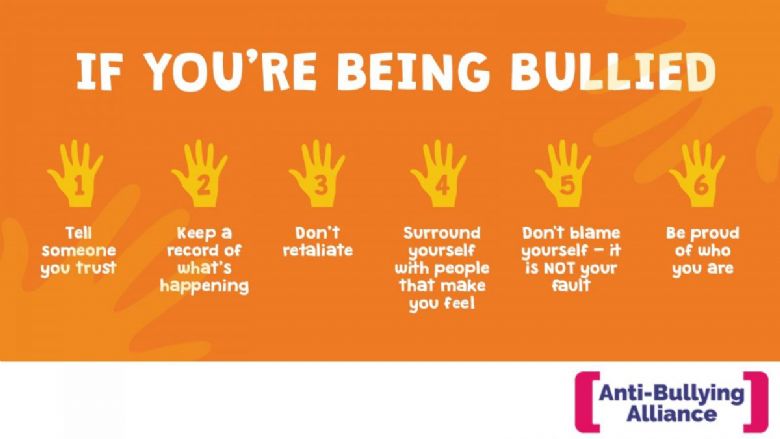What is Bullying?
'the repetitive, intentional hurting of one person or group by another person or group, where the relationship involves an imbalance of power. It can happen face to face or online'
Anti-Bullying Alliance

Are you being bullied?
If you are being bullied, don't keep it to yourself. Tell an adult you trust today.
- It doesn’t matter what colour hair you have; what trainers you are wearing; how you speak; how you walk; how you talk – it is not your fault if you get bullied. We are all different in some way and that’s what makes us amazing.
- Whether you are a boy or a girl, old or young, big or small – bullying makes you feel rubbish and it’s okay to be upset about it. The important thing is that you tell someone about it.
- If you feel you can, talk to a teacher you trust or a family member. If you don’t want to do that you can always call Childline 0800 11 11 or visit www.childline.org.uk.
- Write down what happened, when it happened, and who was involved. If the bullying is online, keep the evidence – save or copy any photos, videos, texts, e-mails or posts.
- It can be tempting if you are being bullied to take revenge – for example to send a horrible message back to someone; to try and embarrass and hurt the other person, or to fight back. This is not a good idea – you might end up getting in trouble or get yourself even more hurt.
- Think about other ways you can respond to bullying. For example, practice saying ‘I don’t like it when you say that/do that – Stop.' Think about other people who can help you if you are being bullied – this could be other classmates, or a teacher.
- Only spend time with people who make you feel good about yourself. If someone constantly puts you down they are not a real friend/ boyfriend/ girlfriend and not worth your time.
- Be kind to yourself, and do things that make you feel good, relax and make new friends. You might make music; write lyrics; draw cartoons; dance; act or join a sports club. This is your life so make sure it’s the best life possible – don’t let anyone bring you down.
- Remember to respect other people! Just because someone is different to you and your friends – that doesn’t mean you are better than them or have a right to make them feel bad. If you mess up, say sorry. You don’t have to be friends with everyone – but you should always make it clear that you don’t like it when people bully others, and stick up for people who are having a hard time.
More information can be found on: www.anti-bullyingalliance.org.uk
Helplines
ChildLine: ChildLine is the UK's free, confidential helpline for children and young people. They offer advice and support, by phone and online, 24 hours a day. Whenever and wherever you need them, they'll be there. Call 0800 1111. They have a designated page for bullying issues that includes a new video about building up your confidence after bullying.
Direct Gov: Information for young people on cyberbullying, bullying on social networks, Internet and email bullying, bullying on mobile phones, bullying at school, what to do about bullying, and information and advice for people who are bullying others and want to stop.
EACH: EACH has a free phone Actionline for children experiencing homophobic bullying: 0808 1000 143. It's open Monday to Friday 10am-5.00pm
Websites
The websites below have lots of information and advice for anyone who has experienced bullying.
The Child Exploitation and Online Protection Centre (CEOP) maintains a website for children and young people, and parents and carers about staying safe online: Think U Know
Childline: information about bullying
Kidscape: information for young people
Advice for Parents
If your child is being bullied at school, please contact us on 01455 845061 or email the school: InfoHLA@midlandat.co.uk
The Anti-Bullying Alliance website has lots of advice for parents. Please click on the link below:
https://www.anti-bullyingalliance.org.uk/tools-information/advice-parents
Cyber-Bullying
Reporting cyberbullying
If someone makes you feel uncomfortable or upset online, talk to an adult you can trust, such as a relative or a teacher. If you would prefer to talk to someone in confidence you can contact Childline (0800 1111)
If someone has acted inappropriately online towards you, or someone you know, you can report directly to the Child Exploitation and Online Protection Centre (CEOP). It could be sexual or threatening chat, or being asked to do something that makes you feel uncomfortable or someone asking to meet up.
Top tips for parents and carers can be found on our Heath Lane Safeguarding pages or the anti bullying alliance.


